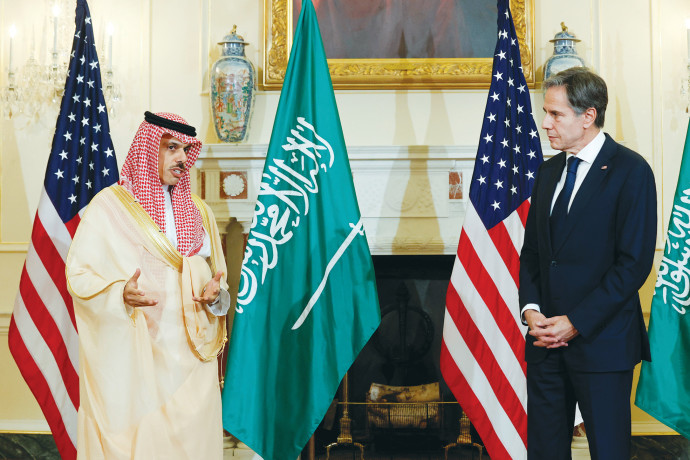What could be described as a calculated criticism of Iran by the International Atomic Energy Agency (IAEA) Board of Governors appears to have been the final warning to Tehran before breaking off negotiations and moving to a Plan B.
The United Nations agency’s criticism focused on Tehran’s lack of cooperation for failing to provide adequate explanations for its search for traces of nuclear material at the three unauthorized sites.
The United States and the E3 (Britain, France and Germany) voted in favor of the first criticism of Tehran at the UN since June 2020, with 30 members voting in favor of the resolution, Russia and China opposed, and India, Libya and Pakistan abstaining. For now, it is clear that international hopes for a nuclear agreement linger.
When Iran announced it would remove 27 surveillance cameras from its nuclear facilities, following the position of the IAEA Board of Governors, IAEA chief Raphael Grossi warned that it would be fatal to the nuclear agreement if the cameras were not returned within three to four weeks.
US Secretary of State Anthony Blinken said Iran’s decision to close the cameras would undermine efforts to revive the 2015 nuclear agreement.

So, hopes riding on that agreement have not yet died. Britain, France and Germany issued a joint statement urging Tehran to urgently accept the agreement on the table, saying a viable deal has been on the table since March 2022.
Obviously, the West still cherishes the hope of reviving the agreement. Iran understands that the IAEA Board of Governors’ position is only a tactical move to force it to accept what was achieved in Vienna.
Tehran will not compromise
Therefore, Tehran will not compromise, but is likely to take countermeasures in the context of a new tug-of-war in which the position of the Western side appears relatively weak for several reasons. The first is weakness or lack of strategic alternatives if negotiations fail.
The second is the international environment and current events that are in the interest of the Iranian side and weaken the position of the US and its European partners, especially with regard to the crisis in Ukraine, which has strengthened Iran’s strategic position in terms of the need to access Iranian oil to help make up for Russian oil supplies to Europe.
The crisis has exacerbated disagreements and contradictions among the major powers (the US and its Atlantic allies, on the one hand, and Russia and China, on the other), making a unified international strategy to resolve the Iranian nuclear issue unlikely, to say the least, under current conditions.
In the West, there are reports that America is moving to a Plan B, which was talked about just a year ago. These were mostly veiled warnings to the Iranian side. It is not about having an alternative plan in case the negotiation scenario fails.
THIS IS an obvious problem in the strategic planning of a superpower like the US. So the issue is not whether or not there is a plan, but rather the nature of the plan and its likelihood of success in light of current and past experiences. Media reports and analysis show that the alternative plan is built primarily on tougher sanctions against Iran.
This is the issue that needs to be discussed realistically. What Iran has done in recent years has been under the umbrella of sanctions that have not prevented Tehran from militarizing its own capabilities, regardless of the limits of those capabilities.
Some even believe that there is a state of coexistence with the sanctions that have been imposed since 2006, while others believe that the Iranian regime does not really want a complete end to those sanctions.
Sanctions
These sanctions have created deep networks of interests whose participants will not welcome any measure that deprives them of the huge profits that grow thanks to the evasion of sanctions, for example, through the smuggling of oil and derivatives. The regime is used to living under sanctions that serve as a gratuitous justification for the deteriorating living conditions of the Iranian people.
The Israeli ambassador to the UN, Gilad Erdan, said earlier that the estimate that Iran will return to the 2015 nuclear agreement has dropped from about 80% to 30%, and in the current situation, rather than in a few years, the 30% is almost a thing of the past.
The prospect of reviving the nuclear agreement has become a “maybe” that is not supported by facts and evidence.
The main US message is that the Biden administration will impose additional sanctions on Iran if the nuclear agreement is not revived.
This message does not deter Tehran or frustrate its regime, even though the sanctions already in place have had profound and undeniable consequences for the Iranian economy. But the experience with and getting used to these sanctions support the regime’s position.
It will not change its behavior until it gets what it wants. Tehran’s biggest problem is the lack of negotiating tools, namely a state of international consensus. This is something completely out of reach, given the current world geopolitical situation and the lack of stick-wielding.
The most worrisome scenario for the Iranians was in earlier times, especially after the invasion of Iraq in 2003, when Tehran voluntarily cooperated with the US for fear of being bombed by a military machine already on its borders.
There are signs that Tehran is speaking more boldly about its deterrent capabilities and developing military sophistication that it believes can save it from a military strike, whether by Israel, the US, or both, using drones, an arsenal of ballistic missiles and proxies, which pose a grave threat to the security of Israel and the Gulf States.
The writer is a UAE political analyst and former Federal National Council candidate.
